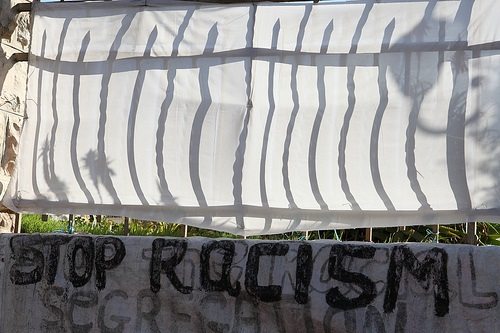
June 29, 2016, Hyperallergic
Philip Jackson at the Black Star Project recently took his rhetorical case against the MacArthur Foundation to the streets in the form of a “Children’s March.” Jackson’s community is making a new demand:
The children of Chicago are demanding that $100 million of the $7 billion MacArthur Foundation has in assets be used to invest in Black communities and help Black children in Chicago survive violence in their communities.
Zoe Mendelson at Hyperallergic suggests that the Black Star project’s campaign “asks troubling questions about the ethics of cultural philanthropy in times of crisis.” When the MacArthur Foundation offered a response to Jackson’s op-ed in Crain’s Chicago Business, Mendelson pointed out that while the foundation’s philanthropy in Chicago is impressive, its response to Jackson’s charges failed to address his primary complaint that the foundation’s “2015 grantees lacked black-led organizations.”
Jackson wrote his op-ed a few days before the Memorial Day weekend, over which 64 people were shot and six died. A few days after Memorial Day, the MacArthur Foundation announced 100 & Change, a global competition for a $100 million grant to fund a proposal that solves “a significant problem.” After a close call where Chicago Public Schools almost did not open in the fall because of political gridlock, some Chicagoans might find the timing of this new MacArthur Foundation initiative at best insensitive and at worst indicative of perceived indifference on the part of the foundation. (Of course, the shocking violence erupting across the U.S. places an even harsher glare on this stubborn debate.)
A new Pew Research Center survey may help us better understand why the MacArthur Foundation and Philip Jackson are having such a difficult time finding common ground: “On Views of Race and Inequality, Blacks and Whites Are Worlds Apart.”
Sign up for our free newsletters
Subscribe to NPQ's newsletters to have our top stories delivered directly to your inbox.
By signing up, you agree to our privacy policy and terms of use, and to receive messages from NPQ and our partners.
Arguably, solving racism is beyond the reach of grantmaking. This national crisis won’t necessarily be solved by spending $100 million, or even $100 billion. “Strategic Philanthropy“ is helpless in the face of this volatile challenge.
Philanthropy tempts us at the point of our carefully planned programs: not that we strive to have them all fully funded, but that we might think of nothing else and devote ourselves to them at the expense of striving for authentic solidarity with the people we are trying to help.
Philanthropy tempts us at the point of our ambitions: not that we actively exclude others, but that we learn to live with racism and maintain a discreet silence in its presence.
Philanthropy tempts us at the point of our goals: not that our aims are not worthy, but that we want to be the heroes.
NPQ has written extensively of racism—naming it, addressing it, and pointing out the ways it is hidden just out of sight in nearly every aspect of modern society. Here is the conclusion to an article by John Dovidio and Samuel Gaertner:
In conclusion, we can no longer be passive bystanders to racism. We have to hold ourselves responsible. Abstaining from wrongdoing that is immediately obvious to us is not enough. It doesn’t begin to address the now convoluted and confusing nature of contemporary racism. In order to address contemporary racism, even and especially among well-intentioned people, it is necessary to establish new, positive norms for action that replace our current norms for avoidance of responsibility.
All of this having been said, we could well imagine (and even long for) a scenario wherein the MacArthur Foundation breaks its own mode and makes a different kind of Big Bet—partly symbolic and partly dead practical—taking that $100 million out of its asset base rather than its grant budget to weigh in and make a statement about the importance of this moment.—James Schaffer











